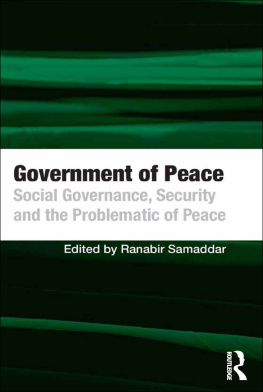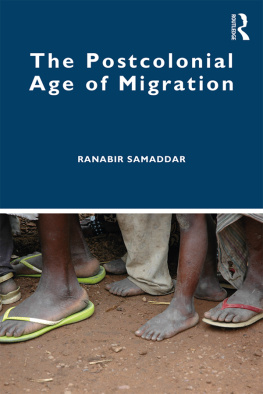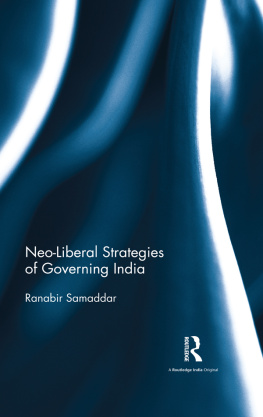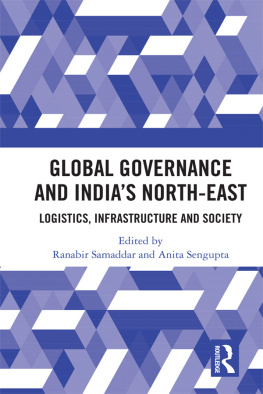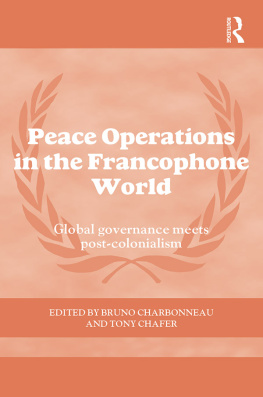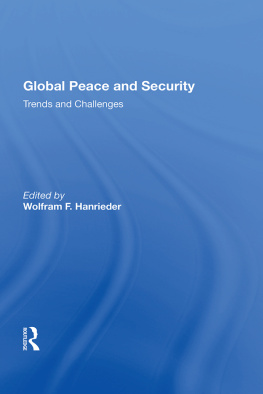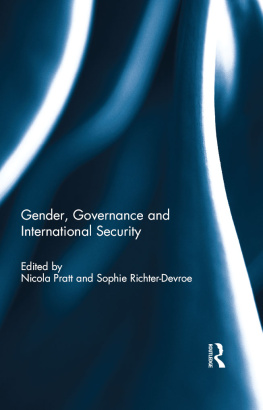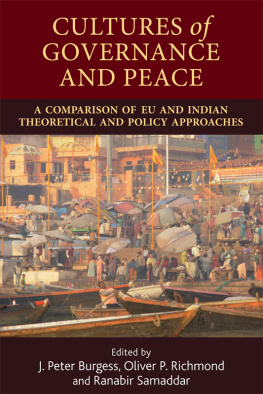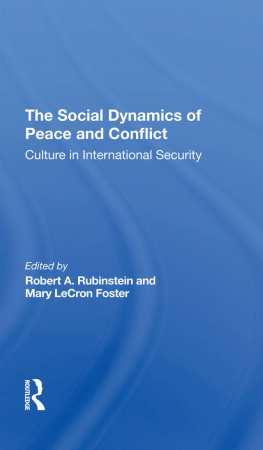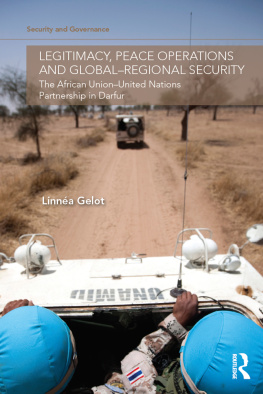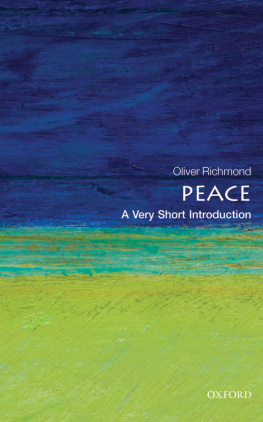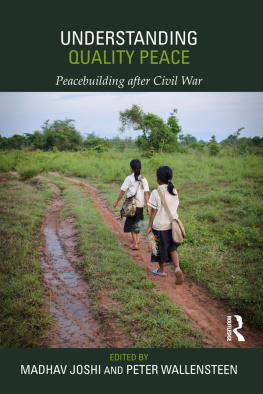GOVERNMENT OF PEACE
Government of Peace
Social Governance, Security and the Problematic of Peace
Edited by
RANABIR SAMADDAR
Calcutta Research Group, India
First published 2015 by Ashgate Publishing
Published 2016 by Routledge
2 Park Square, Milton Park, Abingdon, Oxon OX14 4RN
711 Third Avenue, New York, NY 10017, USA
Routledge is an imprint of the Taylor & Francis Group, an informa business
Copyright Ranabir Samaddar 2015
Ranabir Samaddar has asserted his right under the Copyright, Designs and Patents Act, 1988, to be identified as the editor of this work.
All rights reserved. No part of this book may be reprinted or reproduced or utilised in any form or by any electronic, mechanical, or other means, now known or hereafter invented, including photocopying and recording, or in any information storage or retrieval system, without permission in writing from the publishers.
Notice:
Product or corporate names may be trademarks or registered trademarks, and are used only for identification and explanation without intent to infringe.
British Library Cataloguing in Publication Data
A catalogue record for this book is available from the British Library
The Library of Congress has cataloged the printed edition as follows:
Government of peace : social governance, security and the problematic of peace / edited by Ranabir Samaddar.
pages cm
Includes bibliographical references and index.
ISBN 978-1-4724-3491-3 (hardback) -- ISBN 978-1-3155-8565-9 (ebook) --
ISBN 978-1-3171-2537-2 (epub) 1. Peace-building-India. 2. Conflict management--India. 3. Social justice--India. 4. Internal security--India. 5. India--Politics and government. I. Samaddar, Ranabir, editor of compilation.
JZ5584.I4G68 2015
303.660954--dc23
2014030869
ISBN 9781472434913 (hbk)
ISBN 9781315585659 (ebk-PDF)
ISBN 9781317125372 (ebk-ePUB)
Contents
Ranabir Samaddar
Sajal Nag
Subir Bhaumik
Samir Kumar Das
Paula Banerjee
Manish K. Jha and Pushpendra
Mithilesh Kumar
List of Tables, Maps and Figures
Tables
Maps
Figure
List of Contributors
About the Editor
Ranabir Samaddar, Director of the Calcutta Research Group, belongs to the school of critical thinking. He has worked extensively on forced migration, the theory and practices of dialogue, nationalism and post-colonial statehood in South Asia, and new regimes of technological restructuring and labour control.
List of Contributors
Paula Banerjee is an associate professor of South and Southeast Asian Studies at the University of Calcutta, and is the President of the IASFM (International Association for the Study of Forced Migration (20122014). She won the Fulbright Visiting Scholar Programme for the academic year of 20132014.
Subir Bhaumik is a former BBC correspondent and now senior editor with bdnews24.com. He was a Queen Elizabeth House fellow at Oxford University and Eurasian-Net Fellow at Frankfurt University.
Samir Kumar Das is Professor of Political Science and currently the Dean, Faculty of Arts at the University of Calcutta, India. Formerly Vice-Chancellor of the University of North Bengal and Adjunct Professor, Georgetown University (2014), he was also a Post-Doctoral Fellow (2005) of the Social Science Research Council (South Asia Program).
Manish K. Jha is Professor at the Centre for Community Organization and Development Practice, School of Social Work, Tata Institute of Social Sciences (TISS). His areas of interest include human rights, human development and human security, governance, peace and conflict resolution, social movements, disaster and development.
Mithilesh Kumar is a doctoral candidate at the Institute for Culture and Society, University of Western Sydney. His areas of interest include political economy, urban studies, urban politics, city politics, airport studies, and Marxist theory.
Sajal Nag is a professor in the Department of History, Assam University, and specializes in modern and contemporary Indian history especially nationalism and ethnicity.
Ranabir Samaddar: See About the Editor.
Pushpendra Kumar Singh earlier the Director, Centre for Social Studies, Surat, is a now a Professor at the Centre for Community Organization and Development Practice, School of Social Work, Tata Institute of Social Sciences (TISS). His areas of interest include agrarian relations, land reforms, rural labour, caste and governance.
Acknowledgements
The volume would not have been possible without the mutual understanding and support of the authors of the chapters and their readiness to revise their papers again and again to fine-tune the collective thrust of the work. Within Calcutta Research Group (CRG) our special thanks to go to Sabyasachi Basu Ray Chaudhury, Atig Ghosh, and Suhit K. Sen for preparing notes, summarizing various arguments, reflecting on them, and giving us the benefit of their views, and finally helping the editor in preparing the manuscript for publication. CRG once again relived itself as a research collective in the process of engaging in this research and publication.
This research was carried out as part of a project, The Role of Governance in the Resolution of Socioeconomic and Political Conflict in India and Europe, under the European Communitys Seventh Framework Programme (FP7 20072013) under grant agreement no. 266931. Our thanks go to the European Commission for supporting this research. On behalf of CRG we remain beholden to each of our partner institutions in the project: in Europe PRIO (Peace Research Institute Oslo), the University of Manchester, Berghof Conflict Research Centre in Berlin, the Central European University in Budapest, and the Istituto Affari Internazionale in Rome, and in India the Society for Participatory Research in Asia (PRIA) in New Delhi, Malaviya Centre for Peace Research at Benares Hindu University, Jawaharlal Nehru University, and the University of Delhi. Our special thanks go to our two great intellectual collaborators in this research, J. Peter Burgess of PRIO and Oliver Richmond of Manchester University, for their constant suggestions, readiness to share their views, and active engagement with the findings we proposed from time to time and which kept on evolving during the three year research programme.
We are also grateful to Rob Sorsby of the Ashgate Publishing for reposing faith on the theme and this work and the two anonymous reviewers for suggesting ways of improving the manuscript.
Introduction
I
In 2011 Calcutta Research Group (CRG) joined a collective research programme supported by the European Commission on a study of governance, conflicts, and peace-building in Europe and India in which ten European and Indian institutions participated. Among the various questions probed in this programme were: Is there something specifically post-colonial in the way the Indian government over the years has handled conflicts? Also, as the other side of the inquiry, is there anything specific in the ways people in conflict-ridden areas have sought peace? In what way has justice featured in the subaltern history of peace-making? In trying to understand the post-colonial nature of the question or the two questions, we also tried to make sense of the continuities and the discontinuities between the colonial mode of establishing peace, which was known as pacification, and the post-colonial mode. We also tried to see how governing modes evolve because governing is essentially governing conflicts, administering modes of management and resolution of conflicts, and, at least in some cases, transforming the conflicts in the process. In other words, the relationship between governance, conflict, and peace-building is dynamic and our research had to take into account the dynamics of the relation while studying the questions. These questions were and are still being addressed in the context of the new kinds of conflicts that have engulfed many parts of the world after the


